Grande Histoire du Blues en 100 chansons
Voici les 100 morceaux les plus célèbres de l’histoire du blues rassemblés par Gérald Aubepart dans l’émission "Closing Time" depuis 1983 sur Radio Primitive à Reims. Gérald Aubepart, notre canal historique nous a quittés le 13 septembre 2016. Toutes les semaines il postait un standard du blues. Voici ce qu’il vous offre, mise à jour en cours pour compléter ses nombreuses découvertes.

Prodigal Son Wilkins was born in Hernando, Mississippi, 21 miles from Memphis. He worked in Memphis during the 1920s at the same time as Furry Lewis, Memphis Minnie (whom he claimed to have tutored). His best known songs are "That’s No Way To Get Along" (to which he – an ordained minister since the 1930s – had changed the ’unholy’ words to a biblical theme and since titled it "The Prodigal Son", covered under that title by The Rolling Stones
»
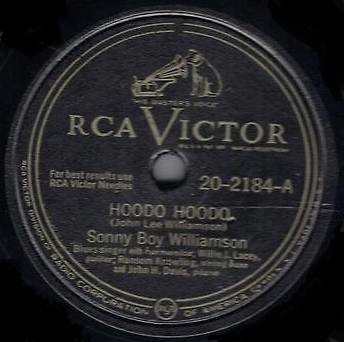
Hoodoo Man Blues Sonny first recorded for Bluebird Records in 1937 and his first recording, "Good Morning, School Girl", became a standard. Other well-known recordings of his include "Sugar Mama Blues", "Shake the Boogie", "You Better Cut That Out", "Sloppy Drunk", "Early in the Morning" and "Stop Breaking Down" and "Hoodoo Hoodoo" aka "Hoodoo Man Blues
»
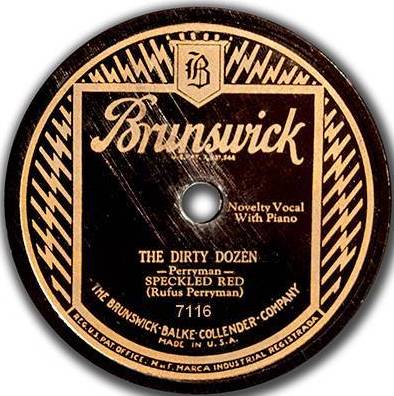
Dirty Dozens Speckled Red was born Rufus Perryman in Hampton, Georgia. He was an American blues and boogie-woogie piano player and singer The lyrics were sung rather than spoken, with its elaborate word play and earthy subject matter, "The Dirty Dozens" is considered in some respects an ancestor to rap music
»

Got My Mo-Jo Working
Got My Mo-jo Working" is a 1956 song written by Preston Foster and first recorded by Ann Cole & The Suburban, but popularized by Muddy Waters in 1957
Waters’ rendition of the song was featured on the Rolling Stone magazine’s list of 500 Greatest Songs of All Time at #359
»
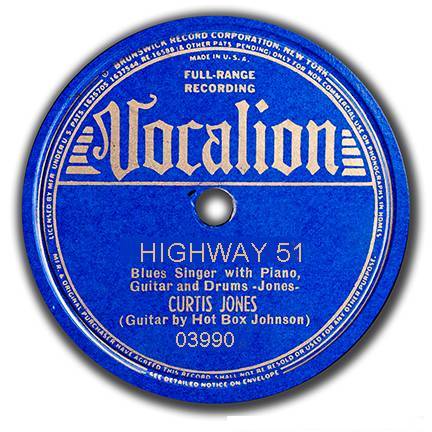
Highway 51recorded January 25, 1938 in Chicago, IL ; Curtis Jones, voc, p ; Willie Bee (James), g, Washboard Sam, wb For the migrant Negro... the long ribbons of the "odd" numbered highways have a magnetic fascination.... He sings of Highway 49.... Often he sings of Highway 61... or of its fellow, Highway 51

Help MeRecorded Fevrier 18, 1963, in Chicago, Illinois ; Sonny Boy Williamson 2, vocal/hca ; .Originally issued on Checker 1036 (45 RPM) in 1963 "Help Me" is a blues standard first recorded by Sonny Boy Williamson II in 1963. The song, a mid-tempo twelve-bar blues, is credited to Williamson, Willie Dixon, and Ralph Bass and is based on the 1962 instrumental hit "Green Onions" by Booker T. and the MGs
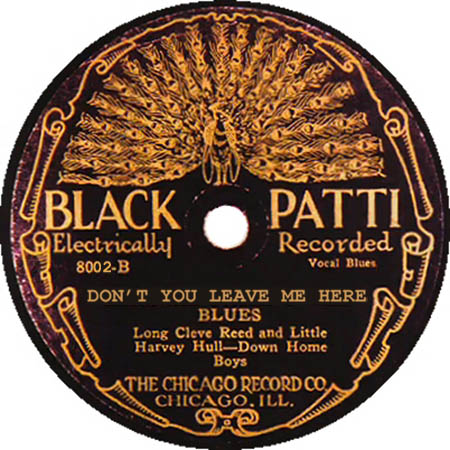
Don’t You Leave Me Here [aka .Alabama Bound]Recorded c. April 8, 1927, in Chicago, Illinois ; Papa Harvey Hull, vocal ; Long "Cleve" Reed, speech and guitar ; Sunny Wilson, guitar...Originally issued on Black Patti 8002 (78 RPM) in 1927 à voir aussi : http://youtu.be/aPo6_ekG4fg

Boogie Chillen "Boogie Chillen’" or "Boogie Chillun" is a blues song first recorded by John Lee Hooker in 1948. It is a solo performance featuring Hooker’s vocal, electric guitar, and rhythmic foot stomps.
Recorded :United Sound, Detroit, Michigan, 3 November 1948
</b

Let The Good Times Roll
"Let the Good Times Roll" is a jump blues song recorded in 1946 by Louis Jordan and his Tympany Five, on the Decca Label. A mid-tempo twelve-bar blues.
The song was written by Sam Theard, a New Orleans-born blues singer and songwriter, and was co-credited to Fleecie Moore, Jordan’s wife.
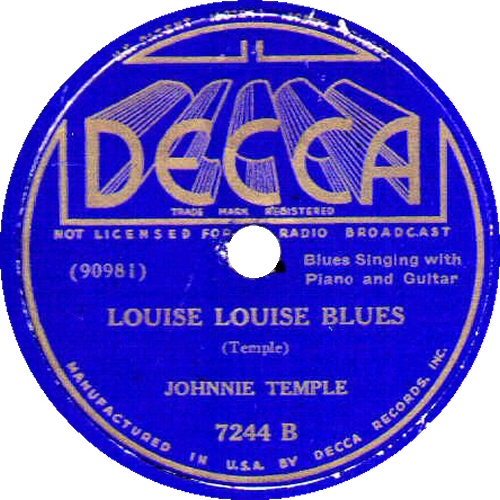
Louise Louise Blues
rec. November 12, 1936 in Chicago, IL ; Johnnie Temple, voc ; Joshua Altheimer, p ; Johnnie Temple or Charlie McCoy, g. Decca 7244
Temple was born in Canton, Mississippi, United States. Growing up around Jackson, he moved to Chicago in early 1930s, and started playing with Joe McCoy in the clubs.His most popular record, "Louise Louise Blues," on the Decca label, was a hit in 1936.